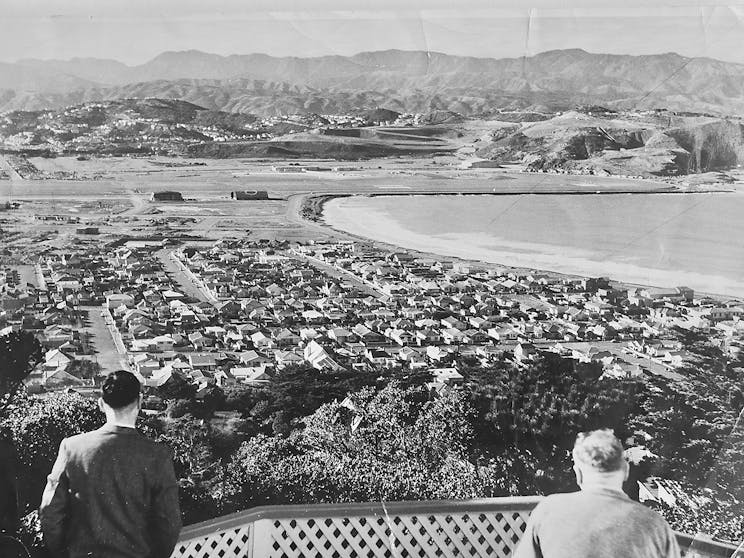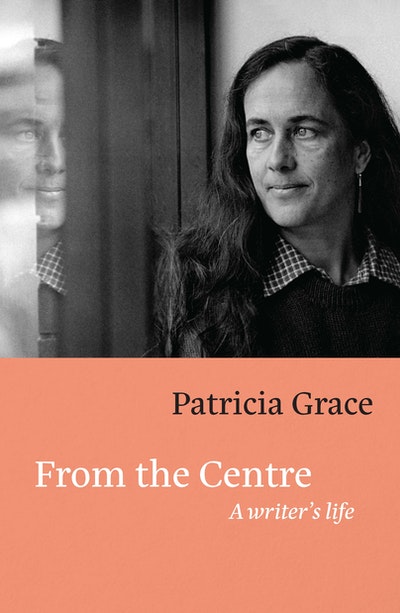- Published: 4 May 2021
- ISBN: 9780143775614
- Imprint: Penguin
- Format: Hardback
- Pages: 304
- RRP: $40.00
From the Centre
A Writer's Life
Extract
They lived with Dad’s family in Hongoeka Bay for a while, but travel to and from his work in Wellington was unaffordable, so my father found lodgings in Wellington for four nights a week with a family who became lifelong friends. He came home on Friday nights after work and left again on Monday morning. These were difficult days for my mother, as she no longer had a job, and it was some time before she was accepted by my father’s sisters.
The couple continued their efforts to find somewhere where they could live together, but were shown only unsuitable and substandard places — unlined basements, sheds, places without cooking facilities, a flat with a cooking ring and an old basin up a flight of stairs out on a landing. The flat in Melrose that they eventually rented after I was born was cold and damp, and had a mouldy kitchen wall, hard up against a bank, which was constantly oozing water no matter what was done to try and stop it or dry it. My mother blamed these damp conditions for my being hospitalised with pneumonia when I was two or three years old. I have a vague memory, which could be related to that time in hospital, of standing in an iron-railed cot, looking at a wall.
They did find better accommodation, also in Melrose, and though I don’t remember the place we lived in I can recall a set of concrete steps which led all the way down to the suburb of Lyall Bay. These steps featured in recurring dreams (nightmares) that I had as I grew older, where three headless soldiers, arm in arm, marched up the steps in semi-darkness. I had other recurring dreams. One was of sitting on a swing and being hit by a strange man with a board every time the swing flew back; another was of speeding through the streets in a bed-on-wheels. This latter was an enjoyable dream, as were dreams I had of flying.
After all their accommodation troubles my parentsbecame determined to own their own home. They saved and put together enough money to purchase a section, ‘a piece of rock’, on the side of a hill in Melrose. Every day after work my father worked there with pick, shovel and wheelbarrow, cutting out a building site. A Māori man in Melrose, or anywhere in the suburbs of Wellington, was a rare sight in those days. Local boys would come by, not too close, and do a mock haka behind him, stamping their feet and chanting mungy mungy typo (mangu, mangu, taipō), big black demon, before running off. One day my father turned as if to chase them. As they ran, one boy fell over and another wet himself. My father used to tell this story as a huge joke. I don’t know how my father managed to acquire a loan to build our Melrose house, as bank loans were not available to Māori at the time. A loan couldn’t have been taken out by my mother, as women were not eligible to borrow money either. Many years later, after my father had died, I found out that an ex–28th Battalion friend of his was working in Wellington. This was Harry Dansey. I hadn’t met Harry, but knew of him as a journalist and author of books concerning the lives and customs of Māori, and as the writer of a theatre play called Te Raukura. I was also aware of him as a judge of short stories for the Penwomen Competitions that I had entered over the years. I decided to introduce myself to him. He remembered my father well, telling me that he and his friends didn’t know how Dad had managed to build a house. Many of them had tried to obtain loans for building and none had succeeded, even though they owned their own land.
But there, eventually, was our house on the side of a hill, taking in a panoramic view over Lyall Bay, Evans Bay, Kilbirnie and the Rongotai Aerodrome where Wellington Airport is now situated, and out to the far hills. It was after we’d moved into our new house that my brother Brian was born. When asked what I thought would be a nice name for this little brother, I believed I was being called on to invent one. I suppose I thought that that was how names came about. My contribution was ‘Bigoni’.

From the house a path zigzagged down to a small lawn and from there down two more levels to vegetable gardens. In the early days, when we first moved in to the house, I would go with my father up the steep slopes behind our place to the hills which backed on to the Newtown Zoo, and were mainly covered in gorse and broom. There were some clear, grassed patches as well. My father took a spade and sack with him. Roaming here and there were old horses — ‘lion tucker’, my father said. They were destined for meals for lions, tigers and the one leopard which paced back and forth in their concrete cages. Once suitable grassed areas were found, my father sliced out even squares of turf and put them in his sack. When he had as much as he could carry, we made our way back down the slope to home, where he placed the day’s collection on the piece of ground he had levelled out for a lawn. With plenty of watering, and several more trips to the hillsides, our lawn came to be — a small patch, not much wider on all sides than the spread of the revolving clothes line at its centre. We could play there, but not too boisterously because if we overstepped the outer edges we’d drop down the hillside in one direction or on to the garden in another.
I spent some time trying to fly from path to lawn, encouraged by my mother to keep trying. What made it seem possible were the terrific southerly busters that hit us full frontal and (it seemed to me) frequently. While I was trying to fly, my mother would be jamming extra pegs into the horizontal washing to keep it anchored.
Between our section and the neighbours was arusty wire fence. It was not made of the usual number eight, but of a much lighter wire that had been joined in several places by twisting two strands together. These twists were at random intervals up and down the steep slope for the whole length of the fence. There was just enough space for me to walk up alongside it, and one morning, when I was about four years old, I was doing just that when it occurred to me that I should make a ‘wireless’ (which was what we called a radio in those days). So, I walked back and forth, ‘turning on’ all the little twists. When everything was ready, I sat down, put an arm each side of the wires and began plucking with my fingers. I was the player of the golden harp in the Jack and the Beanstalk story. When I did this a whole orchestra started up, the music swirling all around and above me, and went on and on. After a time, I went inside and told my mother about this great thing that had happened. She said it was all in my imagination. I remember feeling disappointed with this response.
Memories get put away, as this one did, for many years. Fifty years later, as a grandmother, I went to a gala organised by the school my two eldest grandchildren were attending. I went the usual rounds of stalls, bought a book, a few raffle tickets and probably something to eat. The highlight for me was the concert in one of the junior classrooms where my grandchildren took part in the class band, playing recorders and percussion. After that I was ready to go home, so I sat down and waited for those I had come with. Nearby was a booth, advertising tea-leaf readings. It was without customers, and had been that way for most of the day as far as I could tell. I thought this could be an interesting way to pass the time and to use up my remaining dollars in favour of the school.
I went in, remembering too late that I don’t drink tea. When I sat down, the woman, draped in filmy colours, greeted me, took up the teapot and poured. I told her of my adverse reactions to both tea and coffee, and said I would like to take just a small sip. She said never mind that, I could just blow on it, which I did. She emptied the cup and turned it upside-down on the saucer, letting the tea leaves form themselves into a pattern on the bottom and lower sides of the cup. She mused over the leaves for a while. Then she said, ‘You do believe, don’t you, that I am going to tell you something worthwhile, something of significance to you?’ I hadn’t realised that the woman had a serious belief in what she was doing. I think I said something like, ‘Er, I, um.’ She said, ‘Never mind. There’s something here to do with harp music. Do you play the harp?’ When I said that I did not, she went on to ask me more questions about harps and harp music, but I didn’t find any connection at all to what she was asking me. I thought she might then look for a new direction among the tea leaves, but she didn’t. She pondered for some time before going on to tell me that a strong memory would come, that it would be important to me and that it was to do with harp music.
Once home, the memory of my DIY wireless came to me in a jolt, the turning of the twists, the plucking of the strings, the ethereal and all-enveloping music that I’d heard. From there came many other memories, over several days, to do with my pre-school self. Perhaps the time was right for a stocktake, time to get in touch with beginnings, a reminder of a time when I’d had an unshakeable self-confidence.
Sometime later I wrote a story called ‘Harp Music’. I don’t know that it’s a particularly successful story, but writing it became a kind of exploration of self. As I wrote there was a sharp image I had in my mind of the joyful girl running towards me in a navy-blue coat. Had I been true to her, I wondered? Had I allowed ‘imagination’ to serve me well?
The music is all around walking, then running, swirling, climbing, and she is part of the playing. There is an eye of moon in the sky and a journey down to the sea walking on rocks in a dress that is yellow. One part of the music has the beat of the sea. There’s smoke from a far chimney going to the eye in the sky.And she is lifting too, lifting to the moon-eye and looking down over water and rocks and trees and paddocks, but at the same time she is playing the music. There are people with faces like wide bowls, looking up at her.After a time she descends and the music is fading. Soon it has all gone but she knows it is her own.She walks beside the fence again turning the switches of her radio, and when everything is done she comes, leggy and laughing and pleased with herself, running towards me.












